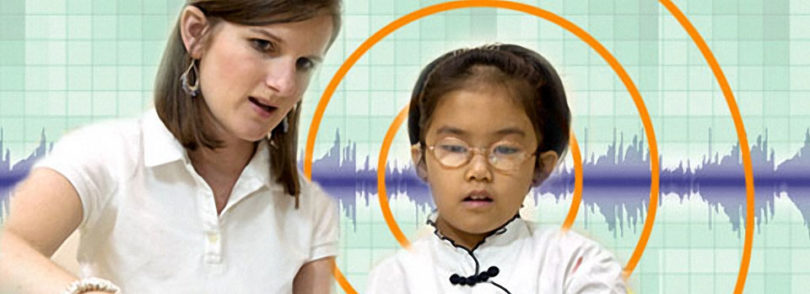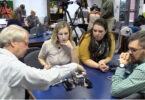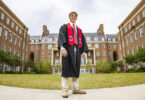Eight-year-old Lucy Zhu looks like any other child in her classroom. She is an adorable Chinese girl with a charismatic smile that carries her through good days and bad.
It’s only when you talk to her that you begin to understand the challenge she faces every day behind that smile. She watches your mouth intently as you speak, as if figuring out a puzzle. When she talks she speaks proper English, but the sounds in certain words are missing, and there is a lack of voice inflection.
“This is very normal for a child that has severe to profound hearing loss in both ears,” said Jane Harvey, coordinator of the UGA Speech and Hearing Clinic, based in the College of Education.
When Lucy was 18 months old, her pediatrician was concerned that she was not speaking or babbling like most babies at that age.
“She did not say ‘mommy’ or ‘daddy’ and when we’d talk to Lucy her facial expressions were blank, like she didn’t understand,” said father Joe Zhu, who is working on his post doctorate in UGA’s College of Agriculture and Environmental Science.
After running several auditory tests on Lucy, she was diagnosed as being severely to profoundly deaf in both ears. Her parents were faced with a difficult decision. They lived in Wisconsin at the time where Zhu was pursuing his doctorate, and money was tight.
After completing his doctorate in plant genetics and breeding at the University of Wisconsin at Madison, Zhu’s academic career path brought his family to Athens in 2002 for his post doctorate work in the department of crop and soil sciences.
“The family contacted us (the Speech and Hearing Clinic) to find out what services the University had available for their daughter,” said Holly Kaplan, a clinical audiologist who has worked with the family since their arrival.
In June 2003, after six months of therapy in Athens, Sun and Zhu decided that Lucy would undergo cochlear implant surgery in her left ear, continuing to rely on a hearing aid in her right ear. Only in extreme situations would bilateral cochlear implants be permitted, due to limited research on the long-term effects of the bilateral procedure.
“A cochlear implant is totally different than a hearing aid,” Kaplan explained, “a hearing aid amplifies sound whereas the cochlear implant compensates for damaged parts of the inner ear, electrifying sounds and sending them to the brain.”
Candidates for the implant are individuals, like Lucy, who are severely hard of hearing. The implant is not a cure-all, but it increases the sounds Lucy hears, and in turn, is able to make. More than 100,000 people worldwide have received the surgery that can cost $75,000 or more.
The combination of the cochlear implant, hearing aid and continuous therapy has paid off for the little girl. By the end of first grade, Lucy placed first in her class in math, second in reading and third in spelling.
“Lucy has been in therapy with us for nine consecutive semesters, and although she will have spot checks throughout her life, she won’t need our therapy too much longer.” said Harvey. “She is a very bright girl who will achieve anything she sets her mind to.”








